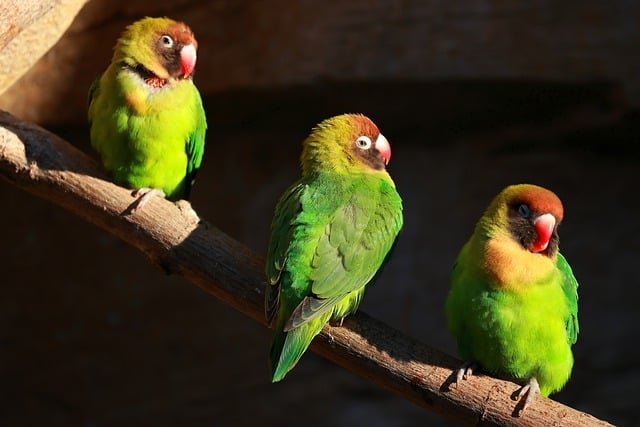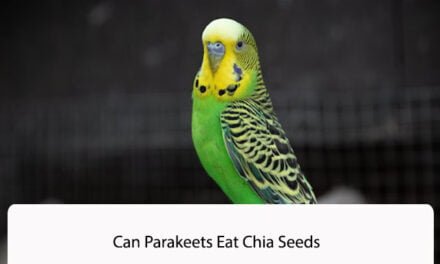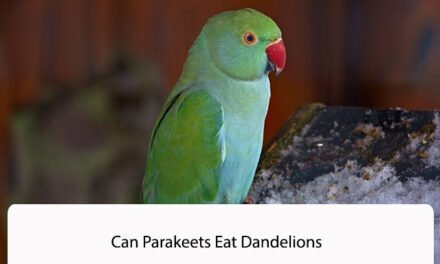Parakeets are small, colorful birds that make delightful pets. As a responsible pet owner, it’s crucial to know what foods are safe for your parakeet to eat. One common question that many parakeet owners have is whether or not their bird can eat raisins.
The short answer is yes, parakeets can eat raisins. In fact, raisins are a healthy and nutritious snack for these birds when given in moderation. However, it’s important to note that while raisins are safe for parakeets, they should not be a staple part of their diet. In this article, we’ll explore the benefits and potential risks of feeding raisins to parakeets, as well as provide tips on how to incorporate them into your bird’s diet safely.

Understanding Parakeets’ Diet
Parakeets are small, colorful birds that make great pets. They are also known as budgerigars or budgies. Parakeets are herbivores, which means they eat only plants. In the wild, they eat a variety of grasses, seeds, fruits, and vegetables. As a pet owner, it is important to understand what your parakeet can eat and what it cannot.
A parakeet’s diet should consist of a balanced mix of seeds, fruits, and vegetables. Seeds are a staple food for parakeets, and they should make up around 60% of their diet. You can buy pre-mixed seed blends that contain a variety of seeds, or you can mix your own. Make sure the seeds are fresh and free of any mold or dust.
Fruits and vegetables should make up the remaining 40% of your parakeet’s diet. These foods provide important vitamins and minerals that are essential for your bird’s health. Some good choices include apples, bananas, berries, carrots, spinach, and sweet potatoes. Make sure to wash all fruits and vegetables thoroughly before giving them to your parakeet.
It is important to note that not all fruits and vegetables are safe for parakeets to eat. Avocado, for example, is toxic to birds and should be avoided. Onions and garlic can also be harmful. Additionally, parakeets should not be given any sugary or fatty foods, such as chocolate or potato chips.
In conclusion, a balanced diet is essential for your parakeet’s health and well-being. Make sure to provide a mix of seeds, fruits, and vegetables, and avoid any foods that are toxic or harmful. With the right diet, your parakeet will be happy and healthy for years to come.
Can Parakeets Eat Raisins?
As bird owners, we always want to make sure that our pets are getting the right nutrition. Parakeets are no exception, and we often wonder if it is safe for them to eat certain foods. One such food is raisins.
Raisins are a popular snack for humans and can be found in many households. However, when it comes to feeding raisins to parakeets, we need to exercise caution.
While raisins are not toxic to parakeets, they are not a natural part of their diet. Parakeets are seed-eating birds and require a balanced diet of seeds, fruits, vegetables, and protein. Raisins are high in sugar and can cause digestive issues if consumed in large quantities.
If you do decide to give your parakeet a small amount of raisins as a treat, make sure to remove the seeds and chop them into small pieces. This will help prevent choking and make it easier for your parakeet to digest.
In summary, while raisins are not toxic to parakeets, they should not be a regular part of their diet. As bird owners, we need to make sure that our pets are getting the right nutrition and providing them with a balanced diet is essential for their health and well-being.
Effects of Raisins on Parakeets
Raisins are a popular snack among humans, but can parakeets eat raisins? In this section, we will discuss the effects of raisins on parakeets.
Firstly, it’s important to note that raisins are high in sugar and can cause weight gain in parakeets if consumed in excess. Additionally, raisins contain small amounts of toxins that can be harmful to birds if consumed in large quantities.
Consuming a small amount of raisins occasionally is unlikely to cause harm to a parakeet. However, we recommend avoiding feeding raisins to parakeets on a regular basis.
It’s also important to note that raisins should never be a substitute for a parakeet’s regular diet. Parakeets require a balanced diet that includes a variety of fruits, vegetables, and seeds.
In summary, while raisins are not toxic to parakeets, they should be fed in moderation. A balanced diet that includes a variety of foods is essential for a parakeet’s health and well-being.
Healthy Alternatives to Raisins for Parakeets
As responsible pet owners, we want to make sure that our parakeets are getting the best nutrition possible. While raisins may be a tasty treat for us, they are not the healthiest option for our feathered friends. Luckily, there are plenty of healthy alternatives that we can offer our parakeets instead.
One option is to provide fresh fruits and vegetables. Parakeets love a variety of fruits and veggies such as apples, bananas, grapes, carrots, and broccoli. These foods are packed with vitamins and minerals that are essential for our parakeets’ health.
Another option is to offer seeds and nuts. These can be a great source of protein and healthy fats for our parakeets. Some good options include sunflower seeds, pumpkin seeds, almonds, and walnuts. However, it’s important to remember that seeds and nuts should be given in moderation as they are high in fat.
If you’re looking for a special treat for your parakeet, you could offer them a small piece of whole grain bread or a cooked egg. These foods are both high in protein and can be a nice change from their regular diet.
In summary, while raisins may be a tempting treat for our parakeets, there are plenty of healthy alternatives that we can offer them instead. Fresh fruits and vegetables, seeds and nuts, and whole grain bread or cooked eggs can all be great options to keep our parakeets happy and healthy.

How to Feed Your Parakeet Raisins Safely
Feeding your parakeet raisins can be a great way to add variety to their diet. However, it’s important to do so safely to avoid any potential harm to your feathered friend. Here are some tips to keep in mind when feeding your parakeet raisins:
Choose the Right Type of Raisin
Not all raisins are created equal. Some types may contain added sugars or preservatives that can be harmful to your parakeet. When selecting raisins, choose ones that are free from any additives or preservatives. Organic raisins are a good option as they are typically free from any harmful additives.
Moderation is Key
While raisins can be a healthy addition to your parakeet’s diet, it’s important to feed them in moderation. Too many raisins can lead to weight gain and other health issues. As a general rule of thumb, limit your parakeet’s raisin intake to a few pieces per week.
Cut Them Up
Raisins can be a choking hazard for parakeets, especially if they are given whole. To avoid any potential choking incidents, cut the raisins into small, bite-sized pieces before feeding them to your parakeet.
Offer as a Treat
Raisins should be considered a treat and not a staple in your parakeet’s diet. Offer them as a supplement to their regular diet of pellets, fresh fruits, and vegetables.
By following these tips, you can safely feed your parakeet raisins and add some variety to their diet. Remember to always monitor your parakeet’s health and consult with a veterinarian if you have any concerns.
Conclusion
In conclusion, while raisins are not toxic to parakeets, they should not be a regular part of their diet. Parakeets require a varied diet that includes fresh fruits and vegetables, as well as a high-quality pellet or seed mix.
Raisins are high in sugar and can lead to weight gain and other health problems if consumed in excess. Additionally, they do not provide any significant nutritional value to parakeets.
If you do choose to offer raisins to your parakeet, it should be only as an occasional treat and in small quantities. It is important to remember that treats should never make up more than 10% of a parakeet’s diet.
Overall, while parakeets may enjoy the taste of raisins, there are much healthier options available for them. As responsible pet owners, it is our duty to provide our feathered friends with a balanced and nutritious diet that meets all of their dietary needs.

Frequently Asked Questions
What fruits are safe for parakeets to eat?
Parakeets can safely consume a variety of fruits, including apples, bananas, grapes, and melons. However, it is important to remove any seeds or pits before feeding them to your bird. Additionally, fruits should be given in moderation as they contain natural sugars that can lead to obesity and other health issues if consumed in excess.
Can budgies eat dried cranberries?
Yes, dried cranberries are safe for budgies to eat in small quantities. However, it is important to avoid dried fruits that contain added sugars or preservatives, as these can be harmful to your bird’s health.
Are nuts safe for budgies to eat?
In general, nuts are safe for budgies to eat in moderation. However, they should be given sparingly as they are high in fat and can lead to obesity and other health issues if consumed in excess. Additionally, it is important to avoid giving your bird any nuts that are salted or coated in sugar.
Can parakeets enjoy strawberries?
Yes, parakeets can enjoy strawberries in moderation. Strawberries are a good source of vitamin C and other nutrients, but they should be given sparingly as they contain natural sugars that can lead to obesity and other health issues if consumed in excess.
Is it okay for parakeets to eat blueberries?
Yes, parakeets can safely consume blueberries in moderation. Blueberries are a good source of antioxidants and other nutrients, but they should be given sparingly as they contain natural sugars that can lead to obesity and other health issues if consumed in excess.
Can parakeets consume bread?
Parakeets can consume small amounts of bread as a treat, but it should not be a regular part of their diet. Bread is high in carbohydrates and can lead to obesity and other health issues if consumed in excess. Additionally, it is important to avoid giving your bird any bread that contains added sugars or preservatives.





